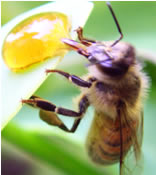Honey Bees are in crisis. This beneficial insect, which pollinates the flowers that color our gardens and most of the agricultural crops we eat, has been under attack in recent years. Honey bee populations across the U.S. have been decimated by disease, pesticides, parasites, habitat loss and severe weather. For the past eight years commercial beekeepers have been losing a third of their bees each year.
Interesting Honey Bee Facts
- Honey Bees will forage two miles from their hive.
- When bees return to their hives, they share directions to new food sources by performing a “waggle dance” for their hive mates.
- Honey bees have a keen sense of smell which they use to differentiate the best flowers for nectar and pollen gathering. But bees also use scent to identify hive mates. Each bee colony has its own unique scent.
- Honey bees have five eyes. The two large eyes on the sides of their head are used for primary sight, but bees also have three simple eyes in the center of their head that serve as navigational aids during flight.
- Bees are color blind and cannot see red. Their sight is limited to the blue-green spectrum, although they can see some yellows and oranges. However, bees can see ultraviolet light which they use to find nectar and pollen.
As beneficial as honey bees are, a hive on your Monmouth County property poses a serious stinging risk. If you find a hive on your property, call Allison Pest Control’s bee removal experts. Honey bees are protected under federal law and cannot be exterminated, but we can arrange for safe bee relocation and hive removal by a qualified beekeeper.
